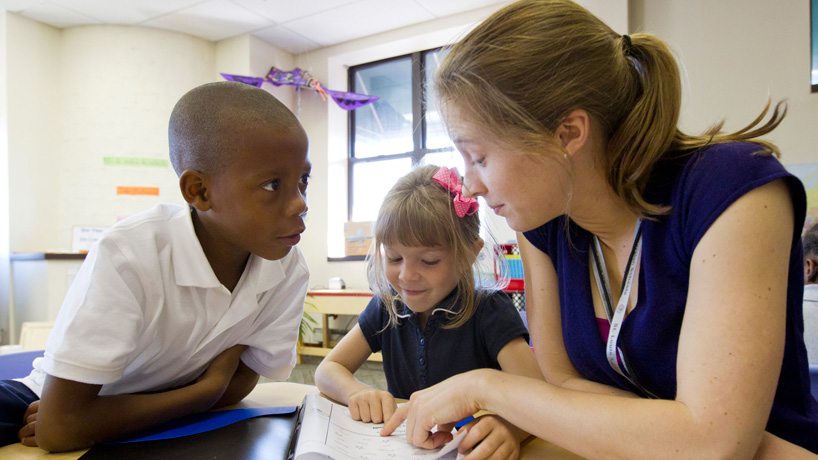
Shea Kerkhoff, Katie O’Daniels and Nancy Singer will partner with 40 schools in the St. Louis region to provide year-round support to K-12 educators. They will also develop literacy instruction resources that will be turned into modules hosted on the Missouri Department of Elementary and Secondary Education website. (Photo by August Jennewein)
Adults already proficient with language too often forget about the challenge of learning to read and write as a child. But literacy education is fundamental to students’ success as they advance in school.
Understanding how language works – grasping the concepts behind words, in addition to being able to pronounce them, and making meaning from written messages – is key to effective learning.
“Being able to read the words on a page is different than literacy,” said Shea Kerkhoff, assistant professor at the University of Missouri–St. Louis. “Literacy means being able to use reading and writing to successfully engage in civics and community life and in your career. Even as a literacy researcher, I continuously learn new words. It’s not like there’s just one point where somebody can read or can’t read. Our reading gets better, especially if we work on it continuously.”
Kerkhoff and her co-principal investigators at UMSL have received $5.1 million in federal funding to help promote evidence-based literacy strategies among local educators and to create online literacy resources.
Too many students in the St. Louis region face concrete challenges to developing literacy skills. Research shows that inequalities related to socio-economic status and race are replicated in literacy. Also, if the language used in school is different than the language used at home, that creates an additional barrier to comprehension.
“Part of what we hope to do with this grant is to bring more culturally responsive literacy education to all of our students,” Kerkhoff said.
The funding will come as two sub-awards, which are part of a larger grant to the state of Missouri. In September, the U.S. Department of Education awarded 11 state education organizations sizable grants for its Comprehensive Literacy State Development program. The Missouri Department of Elementary and Secondary Education received $18 million to be distributed over a period of five years.
Despite the competition for such a lucrative grant, Kerkhoff was hopeful after submitting the proposal this past spring.
“I was really optimistic because of the projects that we put forward,” she said. “I was really confident about the amazing scholars, policymakers, teachers and literacy experts from across the state who were willing to come together to do this work.
“When I found out that we got it, I was just so excited, really excited for our state. These resources are going to go straight to schools and help kids all over our state and especially in our region.”
Kerkhoff will implement the projects with her co-principal investigators Katie O’Daniels, assistant teaching professor and director of Gateway Writing Project, and Nancy Singer, associate professor and director of the Department of Educator Preparation, Innovation and Research.
They will partner with about 40 schools – kindergarten through 12th grade – in the St. Louis region for the larger of the two projects, providing support on literacy education. There will be a focus on schools in Promise Zones.
“When we’re talking about evidence-based literacy strategies, there is the science of reading, culturally responsive literacy teaching, writing education and digital literacy,” Kerkhoff said. “We have experts in all of those areas that are going to be working together to help teachers with the areas that they believe they have the greatest need.”
In practice, this will be achieved through a summer workshop and coaching teachers one-on-one throughout the school year.
Additionally, UMSL will develop literacy instruction resources that will be turned into modules hosted on the Missouri Department of Elementary and Secondary Education website.
To a great extent, this undertaking is possible because of the groundwork already laid by the Gateway Writing Project, part of a network of 175 sites that make up the National Writing Project. The organization supports literacy through the teaching of writing.
“Our goal is to support teachers as writers, helping them understand that if they are writers, that’s going to make their teaching of writing more successful,” O’Daniels said.
She added that the organization provides professional development opportunities by hosting conferences, establishing teaching methods and supporting a youth writing initiative.
Each site is also affiliated with a university, and for the past decade, the five National Writing Project sites in Missouri have partnered with the state to provide training for educators.
“It was through our existing partnerships with the Department of Elementary and Secondary Education that we were brought in to become the sub-awardees of this state level grant,” O’Daniels said. “They’ve worked with our network in the past, and they understood the work we do, our philosophy, the approach we take to literacy teaching and learning and how we work with teachers.”
Kerkhoff and O’Daniels touted the collaborative effort that made this venture a reality.
“Teaching is a really hard job, and it’s more difficult if you don’t have a network of support around you,” O’Daniels said. “I think that the National Writing Project has put in place a network that supports educators, and I hope that we are able to extend that network to our area schools.”














